Beckham, Netflix’s latest sports docu-series, has attracted fans of the sport, the footballer himself and the Posh/Becks dynasty meaning its rise to popularity has been like no other. TikToks of couples recreating the dance to “Islands in the Stream” and compilations of the sports star’s career triumphs show the ways in which David Beckham has been brought back to the forefront of our cultural imagination. And in spite of being an incredible footballer, having captained England and played in various leagues, the documentary brings to light how Beckham is remembered far more for his celebrity than for his sportsmanship.
In spite of being an incredible footballer, the documentary brings to light how Beckham is remembered far more for his celebrity than for his sportsmanship.
The docu-series attempts to humanise the footballer by using never-seen-before footage of his life within and outside the sport. The episodes work to centralise the young, football-focused boy entering Manchester United that is so detached from the narrative of David Beckham the celebrity we tend to observe; they highlight how at the heart, Beckham is a lover of the sport. Titles of the four episodes ring to the different monumental points in the footballer’s career in order to encapsulate this. “The Kick” focuses on the star’s humble beginnings and the incredible bend on his kick, which was famous not only in the history-making goal of 1996 but also for inspiring the film Bend it like Beckham (2002). “Seeing Red” then looks at the impact of the 1998 World Cup incident on the footballer, “Golden Balls” turns to his move to Real Madrid, and “What Makes David Run” concentrates on his move to America with LA Galaxy, AC Milan and Paris Saint-Germain. The series ends with an explicit description of the impact that the man, awarded an OBE for his services to football, has left on the sport, and goes on to imply the legacy he leaves in his son Romeo.
But, as much as the docu-series attempts to contextualise the footballer, it seems to prioritise the proliferation of media around Beckham. There is depth to the series in that the popularity of the show itself demonstrates the content’s underlying focus: how does the sports player become a globally recognised icon? And, how does this global recognition impact the individual’s sport performance and personal life?
Regardless of this personal desire, there was a media obsession with him that seemed, at times, to become unmanageable and out of his control.
Sir Alex Fergurson’s interviews seem to bring to light the disdain towards the footballer’s strive for celebrity status outside the sport. We see this personal strive in Beckham’s paid partnerships with Adidas and other brands in advertisements, and also in his relationship with pop star Victoria Beckham. However, regardless of this personal desire, there was a media obsession with him that seemed, at times, to become unmanageable and out of his control. The “too posh to push” stigma for the footballer’s wife, the cheating scandal, the fear around Brooklyn and the paparazzi after Diana’s death, and the hate received after the World Cup all show how there was an extension from just sports celebrity for Beckham. The media was obsessed with him. Often to his own detriment. England ‘98 squad members Rio Ferdinand and Gary Neville discussed how a lack of discussion surrounding mental health at the time left Beckham at the mercy of the press. His career moves and personal life were often sensationalised by the media and the series was effective in addressing the issues surrounding this aspect of celebrity for the footballer; this topic is particularly relevant considering it was released not long before Movember, men’s mental health awareness month.
In tracking his career trajectory in the docu-series, the entanglement of sports stars, the media and “celebrity” is uncovered. Beckham created a blueprint for footballers on how to obtain brand deals and fame outside of the sport that will help to sustain them when playing the sport at a high level becomes physically impossible with age. He showed a generation of footballers that it is capable to be both incredibly dedicated to the sport whilst having high-fashion brand deals and a relationship with a pop icon. However, his career and the series also work to portray the lasting impact of the press on the footballer; their sense of celebrity is both of their own making, and at the hands of others. Whether for good or for bad, the series showed how two lives, of the celebrity and the footballer, can inextricably become one in David Beckham.



